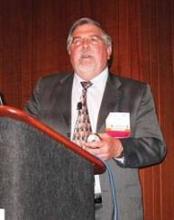PHILADELPHIA – Participants in a peer-mentoring program had lower hemoglobin A1c levels and less severe diabetes over 6-10 months in an initiative that involved more than 550 patients at a single Texas health care organization.
Run at WellMed Medical Management in San Antonio, a primary care–oriented health care organization, the peer-mentoring program "shows what is possible with a well-designed health care system," Dr. Wilson D. Pace said at the annual Congress of Delegates of the American Academy of Family Physicians.
Peer mentoring "is what’s possible with reorganization [of health care delivery] from a strong primary care perspective. WellMed has worked on their model for more than 20 years," said Dr. Pace, a professor of family medicine at the University of Colorado in Denver, and director of the National Research Network of the American Academy of Family Physicians.
Programs like peer mentoring "are much more resource intensive at the primary care level" compared with standard models of care delivery, "but overall costs actually are reduced. Going beyond just health care is how you achieve health," Dr. Pace said in an interview.
"Putting in social systems and thinking about community resources are not usually seen in our health care systems. It takes [a system] willing to take on risk early, because it takes time to see the savings; they don’t happen in the first 6 months," he said.
Dr. Pace and his associates conducted a case study of WellMed to document the effect of management programs that the Accountable Care Organization already had in place. During the course of that evaluation, they suggested to WellMed officials that they also consider starting a peer-mentoring program. To bolster their case, the researchers reviewed reported results from 69 studies on peer mentoring, and found that 60 reported net benefits from this approach.
"We thought that we could put peer mentoring [at WellMed] and show some impact, and when we called they said that they had already been thinking about it; they were very receptive," Dr. Pace recalled.
The WellMed program initially rolled out to 15 of the 23 San Antonio practices in the plan. Over the course of the next 2 years, the peer-mentoring program, which is managed by a nurse practitioner, expanded to all 23 practices and is now overseen by six nurse practitioners. After full implementation, the program involved more than 50 recruited and trained patient mentors, and more than 500 patients with diabetes who were interested in being mentees.
Mentees attended a series of twelve 3-hour, peer-led workshop sessions that dealt with diabetes and self-management. Participants also attended one-on-one and small-group mentoring sessions. In addition, they received personal health records with information that included their blood sugar levels over time, their lab results, and their appointments, to help patients "own" their information.
After 6 months, mentored patients had statistically significant increases in the number of times a week they checked their blood glucose, their knowledge of what hemoglobin A1c means, the quality of their diet, and their activity level. The percent of participants who knew their own A1c level rose from 32% at baseline to 76% after 6 months.


